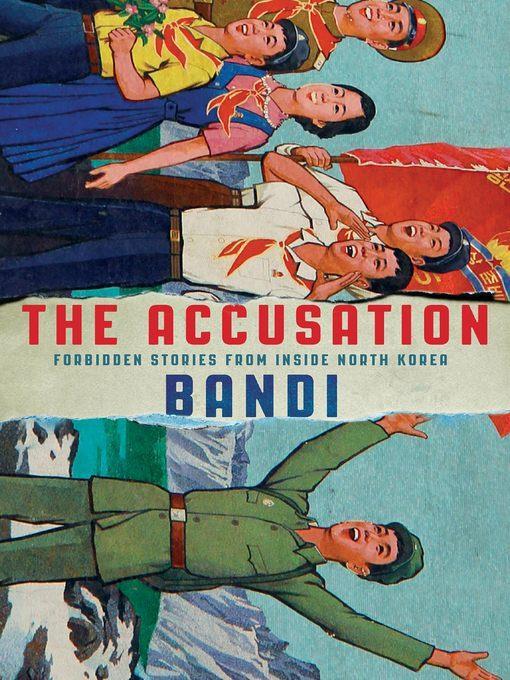
The Accusation
Forbidden Stories from Inside North Korea
کتاب های مرتبط
- اطلاعات
- نقد و بررسی
- دیدگاه کاربران
نقد و بررسی

January 16, 2017
With these uncompromising stories, the pseudonymous Bandi gives a rare glimpse of life in the “truly fathomless darkness” of North Korea. A Pyongyang housewife is accused of attempting to communicate with spies for closing her drapes in “City of Specters.” In “So Near, Yet So Far,” a man finds his village unreachable when he illegally journeys to see his dying mother. Lacking proper documentation, he is forced into a truck, like a pig “being sent to the slaughterhouse.” A similar arc is traced throughout Bandi’s collection, but the most cutting story is “Pandemonium.” A frustrated Mrs. Oh escapes a provincial train station that has been locked down for 32 hours because Kim Il-Sung is traveling in the area. On the way to a nearby relative’s house, she stumbles upon the “Great Leader” himself, a man whose “pale golden clothes seemed to shed a soft veil of mist.” Just as he is graciously giving her a ride, her granddaughter suffers a broken leg back at the station when she’s “buried in a tide of humanity.” Whatever little moral ambiguity the situation might offer is eclipsed by the clarity of Bandi’s anger. The story of the Great Leader’s kindness begins “ringing out from the loudspeaker” of every town in the nation. The only response possible are the granddaughter’s anguished cries, rising in “a full-blown howl.” An endnote about how Bandi’s collection was smuggled out of the country reveals just how miraculous it is that it exists at all.

January 15, 2017
Fugitive fiction--literally--from inside North Korea, devastatingly critical of the Kim dynasty and its workers' paradise.What do you do when your baby cries at a solemn gathering? You excuse yourself and leave the room--unless you're standing before a huge portrait of your beloved leader alongside beloved runner-up Karl Marx, in which case you pray that the baby in question does not bring down suspicion on your head as an enemy of the state, a saboteur, and that the tears do not unleash mythological monsters, to say nothing of "hundreds of figures hovering at [the] windows, peering out like rabbits from their burrows, eyes narrowed in accusation." A squalling infant might be one thing, a drawn curtain another, a bird cage another still: in claustrophobic North Korea, everything has significance, and though ordinary communication comes barking down from loudspeakers, it's the silences and pauses that carry more than their share of the weight. In these seven stories, Bandi--the name means "firefly" in Korean--describes, with numbing gravity, how awful life inside a totalitarian state really is. "What do you think, Comrade Hong," says one bureaucrat, thinking his way through a worker's crime of holding hands with a "factory girl." "Can this be classed a general incident, or is it a political matter?" There is a streak of satire in these stories, but mostly they are grimly realistic. Bandi is rumored to be a writer within the government, and certainly the author has access to the broad sweep of North Korean society, from industrial workers and farmers to midlevel political functionaries; all are equally oppressed by an all-encompassing system that crushes ordinary emotion and replaces it with piety. Laments one young cadre, "Oh, when would Min-hyuk's uncle be allowed to join the Party and see his true worth discovered?" Of more journalistic and sociological than literary interest, without the inventiveness of recent writing south of the 38th parallel--but still an important document of witness.
COPYRIGHT(2017) Kirkus Reviews, ALL RIGHTS RESERVED.

Starred review from February 15, 2017
Initially published in South Korea in 2014, The Accusation continues to make international history as the first literary work smuggled out of repressive North Korea, now headed for shelves around the world. Bandiwhose pseudonym is derived from firefly, an obvious nod to the insect's small light amid vast darknessshockingly remains a prominent North Korean writer. None of his native readers, however, will ever have access to these seven illuminating stories that reveal desperate lives enduring terrifying day-to-day challenges. Written between 1989 and 1995, they share a common, reverberating theme: that survivalalready threatened by starvation, betrayal, brutalitycan hinge on details as absurdly trivial as a crate of rice seedlings, the timing of closed curtains, the placement of an elm tree, a travel pass. British translator Smith (whose rendering of Han Kang's The Vegetarian won 2016's Man Booker International Prize) expertly delivers Bandi's subversive prose with nuanced grace. The afterword further explicates the manuscript's remarkable journey out, with an additional note from the South Korean activist who enabled the precarious north-south crossing. As Bandi's characters both fear and sling accusations, the title takes on piercing gravitas for readers: knowingly turning a blind eye to such inhumanity is not an option.(Reprinted with permission of Booklist, copyright 2017, American Library Association.)

October 1, 2016
No fiction beyond a trickle of agitprop has passed beyond North Korea's borders, and of course dissident voices are suppressed altogether. When it was smuggled out, this story collection became an international publishing sensation. Set during the Kim Jong-Il regime (1994-2011), the seven stories by the pseudonymous author include "The Town of Specters," about a little boy who gets his entire family in trouble when he is upset by a portrait of Karl Marx, whom he takes for the monstrous Eobi of Korean mythology.
Copyright 2016 Library Journal, LLC Used with permission.

























دیدگاه کاربران